Quality Services
At Bright Dental Surgery, we provide quality dental care both for our NHS and private patients in our newly refurbished, modern, safe and friendly environment.

At Bright Dental Surgery, we provide quality dental care both for our NHS and private patients in our newly refurbished, modern, safe and friendly environment.
We provide all aspect of general dentistry and cosmetic treatment including veneers, wisdom teeth, gum disease, posterior/anterior crown, denture relining, etc.
Our highly skilled professional team will ensure that you receive consistently high standard of care.
We also provide hygienist services from only £52.
A fabulous smile that can be up to 6 shades whiter.
Bright Dental Surgery are proud of the wheelchair accessible surgery.

Augustine qualified in 1992 and has worked in maxillofacial surgery departpment of hospitals in the United Kingdom including; Whittington Hospital, London, Hull Royal Infirmary and Leicester Royal Infirmary. During his training in the hospitals, he obtained his postgraduate qualification in Oral Surgery. Augustine also has many years experience working in general dental practice.
Gemma has been a passionate receptionist at Bright Dental Surgery, providing great customer service.

Charlotte has been a passionate receptionist at Bright Dental Surgery, providing great customer service.
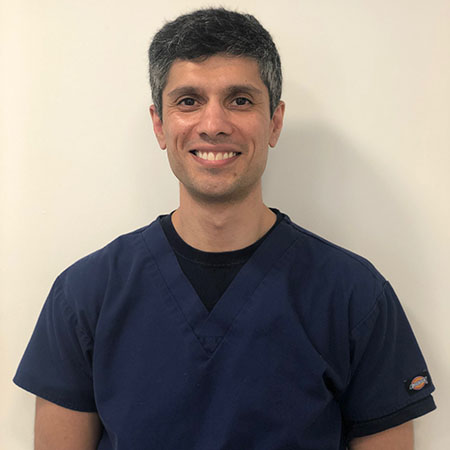
Qualifications: Bsc in Dental Therapy and Dental Hygiene.

Qualifications: BDS GDC 2014
Hygienist offer a professional teeth cleaning service, a process called scale and polish.
During the appointment your hygienist will carry out an initial dental hygiene examination they will then.
Your hygienist will also provide advice about diet and preventing tooth decay. They can spot signs of gum disease and will refer you to a dentist or periodontist if they see anything that needs further treatment
You may assume you should have a dental check-up every six months, but some people may not need to go so often and others may need more frequent checks. Your dentist will suggest when you should have your next check-up based on how good your oral health is. The time between check-ups can vary from three months to two years, depending on how healthy your teeth and gums are and your risk of future problems.
A check-up allows your dentist to see if you have any dental problems and helps you keep your mouth healthy. Leaving problems untreated could make them more difficult to treat in the future, so it's best to deal with problems early, or, if possible, prevent them altogether.
At each check-up, your dentist should:
Dental Radiographs are commonly called x-rays. Dentists use radiographs for many reasons: to find hidden dental structures, malignant or benign masses, bone loss, and cavities.
A radiographic image is formed by a controlled burst of X-ray radiation which penetrates oral structures at different levels, depending on varying anatomical densities, before striking the film or sensor. Teeth appear lighter because less radiation penetrates them to reach the film. Dental caries, infections and other changes in the bone density, and the periodontal ligament, appear darker because X-rays readily penetrate these less dense structures. Dental restorations (fillings, crowns) may appear lighter or darker, depending on the density of the material.

A dental implant is used to support one or more false teeth. It is a titanium screw that can replace the root of a tooth when it fails. Just like a tooth root, it is placed into the jawbone.
Implants are a safe, well-established treatment. It's probably true to say that implants, much like natural teeth, will last for as long as you care for them. How well you look after your implants - and whether you go for your regular maintenance appointments - will have the biggest impact on how long they will last. If you don't look after your implants they will develop a coating similar to what you get on neglected natural teeth. Left untreated, this can lead to gum infection, bleeding, soreness and general discomfort. You could get all these problems with natural teeth. If your implants are well looked after, and if the bone they are fitted to is strong and healthy, you can expect them to last for many years. However, just as with other surgical implants (such as a hip replacement) there is no lifetime guarantee.
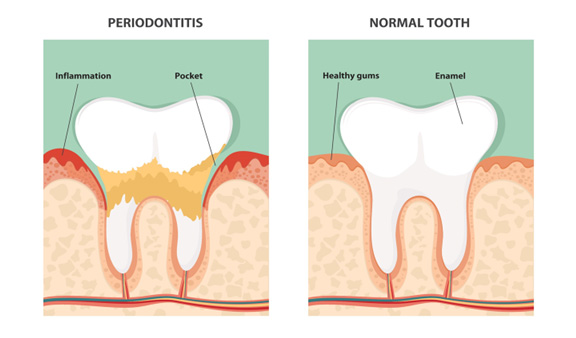
Periodontology is the study of the specialised system of hard and soft tissues that supports your teeth and maintains their position in the jaw. This apparatus, known as the periodontium, has some very important functions: it securely attaches the teeth to the jaws; it acts as a shock absorber during biting and chewing and therefore helps to prevent damage to the teeth from excessive forces; and it maintains the teeth in a stable position within the jaws so that that they work together efficiently and comfortably during chewing.
In many ways, the mouth can be seen as a mirror of the general condition of your body. In particular, our periodontal status can often tell us more than simply what is happening locally in our gums. Although periodontitis is always triggered by plaque accumulation on the teeth, diseases affecting the rest of the body, known as systemic diseases, can weaken the supporting structures of the teeth. Also, some serious disorders are known to show themselves in the mouth before they are evident in any other part of the body. Therefore, it is sometimes the case that a trained periodontist is the first person to detect the signs of a general disease, such as diabetes or blood disorders, when examining a patient’s mouth. Because of this association with general health and overlap with other medical disciplines, periodontology can rightly be regarded as a ‘holistic’ form of dentistry.
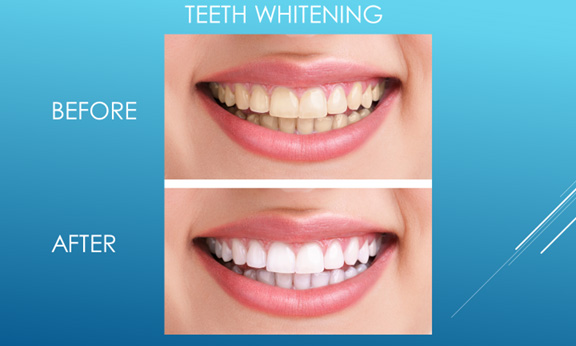
Tooth whitening can be a highly effective, yet very simple way, of lightening the colour of teeth without removing any of the tooth surface. It cannot make a colour change, but lightens the existing colour.
The dentist applies a chemical barrier to the gums, which will protect them during the whitening process. The whitening solution is then applied to the teeth and the chemical is then activated using heat, or heat and light combined. Once the whitening process is finished the barrier will be easily removed in one piece.
If the tooth has been root treated, the canal, which previously contained the nerve, may be reopened and the whitening product is put in.
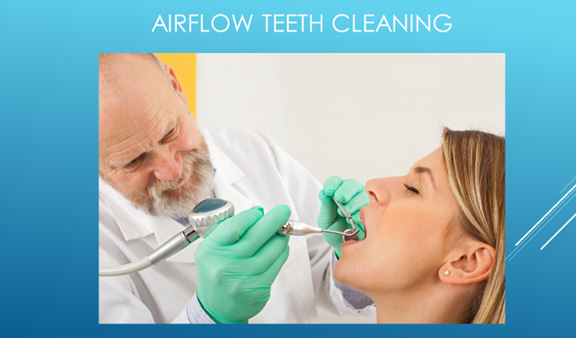
Airflow Polishing or Dental Airflow is a hygiene treatment that effectively removes stains on the front and back of teeth. The procedure works by using a fine jet of compressed air, water and fine powder particles to remove staining caused by coffee, tea, red wine, tobacco and some mouthwashes.
There are lots of reasons why air polishing treatment might be beneficial to you:
If you want a quick fix for a special occasion or that important job interview, air polishing might be for you!

Endodontics is a field of dentistry concerned with the biology and pathology of the dental pulp and root tissues of the tooth. It focuses on the prevention, diagnosis, and treatment of diseases and injuries of these tissues. Root canal are a commonly performed Endodontic procedure.
A mouthguard is a specially made, rubber-like cover which fits exactly over your teeth and gums, cushioning them and protecting them from damage.
It is important to wear a professionally made mouthguard whenever you play sport that involves physical contact or moving objects. This includes: cricket, hockey and football - which can cause broken and damaged teeth; and American football, boxing and rugby - which can all cause broken or dislocated jaws. A mouthguard will help protect against these happening.
Your dental team will be happy to make you a custom-made mouthguard, which will fit your mouth exactly and protect your teeth and gums properly. Custom-made mouthguards can prevent damage to the jaw, neck and even the brain - helping to prevent the concussion and damage caused by a heavy blow.
Most people are now aware that smoking is bad for our health. It can cause many different medical problems and, in some cases, fatal diseases. However, many people don’t realise the damage that smoking does to their mouth, gums and teeth.
Smoking can also lead to gum disease. Patients who smoke are more likely to produce bacterial plaque, which leads to gum disease. The gums are affected because smoking causes a lack of oxygen in the bloodstream, so the infected gums fail to heal. Smoking causes people to have more dental plaque and for gum disease to progress more rapidly than in non-smokers. Gum disease still remains the most common cause of tooth loss in adults.
We provide same day appointment for registered and non-registered patient and if possible, the permenant treatment may be carried out on the same day at a separate cost by mutual agreement.
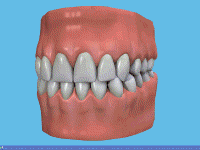
Most adults in the UK have gum disease to some degree and most people experience it at least once. It's much less common in children. If you have gum disease, your gums may bleed when you brush your teeth and you may have bad breath. This early stage of gum disease is known as gingivitis. If gingivitis isn't treated, a condition called periodontitis can develop. This affects more tissues that support teeth and hold them in place. If periodontitis isn't treated, the bone in your jaw may be damaged and small spaces can open up between the gum and teeth. Your teeth can become loose and may eventually fall out.
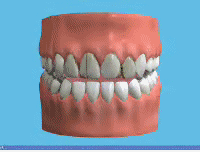
A veneer is a thin layer of porcelain made to fit over the front surface of a tooth, like a false fingernail fits over a nail. Sometimes a natural colour ‘composite’ material is used instead of porcelain. Veneers make teeth look natural and healthy, and because they are very thin and are held in place by a special strong bond (rather like super-glue) very little preparation of the tooth is needed.
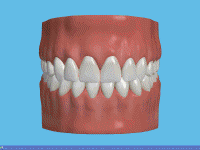
The amount of discomfort will depend on how easy it was to take the tooth out. There is usually some swelling and discomfort for a few days afterwards, and it is important to follow any advice you get about mouthwashes and so on, to help with the healing. Some people also find homeopathic remedies help to reduce discomfort. Usual painkillers such as paracetamol, aspirin or ibuprofen will usually with any pain. It is best to stay fairly quiet and relaxed for 24 hours afterwards to make sue there are no bleeding problems.
There may be some stitches to help the gum heal over. Your dentist will probably want to see you again about a week later to check on the healing, and to remove any stitches.
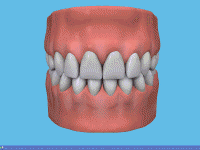
Root canal treatment is a dental procedure used to treat infection at the centre of a tooth (the root canal system). It's also known as 'endodontics'. The infection is caused by bacteria that live in the mouth and invade the tooth. This can happen after:
Bright Dental Surgery
Graphic House
1 - 2 Hermitage Road, St Johns
Woking, Surrey
GU21 8TE
info@bdsurgery.co.uk
P: 01483720240
Monday: 8:00am to 7:00pm
Tuesday: 8:00am to 6:30pm
Wednesday: 8:00am to 5:30pm
Thursday: 8:00am to 7:00pm
Friday: 8:00am to 5:30pm